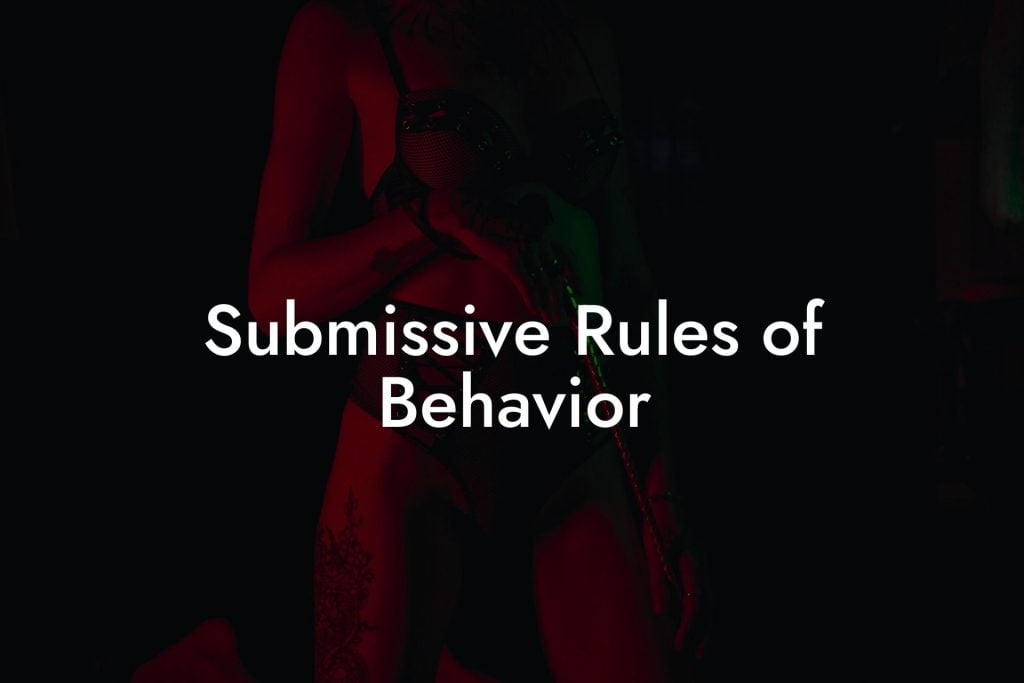Total Power Exchange (TPE) is a fundamental aspect of the BDSM world, where one partner willingly gives up all control and authority to the other. This intense dynamic requires a deep level of trust, effective communication, and a clear understanding of boundaries. In this article, we will explore the essential rules and guidelines for a successful TPE relationship. Whether you're a seasoned practitioner or new to the BDSM scene, these insights will help you navigate this power exchange play with confidence and fulfillment.
- Building Trust: Trust is the foundation of any TPE relationship. Establishing open and honest communication, practicing active listening, and setting clear boundaries is crucial. Create a safe space for both partners to express desires, fears, and expectations. Consistency, reliability, and respecting limits are essential for building and maintaining trust.
- Communication and Consent: Effective communication is key to successful TPE. Discuss expectations, desires, and boundaries openly, ensuring both partners are on the same page. Establish a safe word or signal to ensure consent and provide a means to stop play at any time.
- Negotiating Contracts: TPE relationships often involve detailed BDSM contracts that outline the agreed-upon rules, protocols, and limits. Create a contract that reflects the desires, needs, and comfort levels of both partners. Ensure the contract is revisited and revised as needed to accommodate the growth and evolution of the relationship.
- Consistency and Structure: TPE relies on a structured framework to maintain power dynamics. Consistency in roles, rituals, and protocols help reinforce the power exchange and deepen the emotional connection between partners. Establishing routines and clear expectations helps maintain the desired power balance.
- Aftercare and Emotional Support: Aftercare is crucial in TPE relationships. After intense scenes or play, both partners require physical and emotional support. Ensure a nurturing environment, provide comforting gestures, and engage in open conversations to address emotional needs and foster a strong bond.
Total Power Exchange Rules Example:
Imagine a TPE relationship where the submissive partner entrusts complete control to their Dominant partner. The submissive may adhere to a set of rules, such as addressing the Dominant as "Sir/Mistress" at all times, seeking permission for basic activities like using the restroom, and following a strict schedule of assigned tasks. The Dominant takes responsibility for decision-making, ensuring the submissive's safety, and providing guidance and discipline when necessary.
Frequently Asked Questions
What is a BDSM contract?
A BDSM contract is a written agreement between parties involved in BDSM activities. It outlines the roles, responsibilities, boundaries, limits, and expectations of each person. This document is not legally binding but serves as a tool for negotiation and communication, ensuring that all parties understand and consent to the terms of their relationship or scene.
How does a BDSM contract contribute to power dynamics?
BDSM contracts contribute to power dynamics by explicitly defining the roles of Dominant and submissive and setting clear expectations for behavior and authority within the relationship. They can formalize the power exchange and help maintain the agreed-upon dynamic.
Why is consent critical in BDSM?
Consent is fundamental in BDSM because it differentiates between abuse and a mutually enjoyable experience. It ensures that all parties are willing participants who have openly agreed to the activities and the dynamics of the relationship without any coercion or pressure.
Can a BDSM contract include safewords?
Yes, a BDSM contract can and often does include safewords. These are pre-negotiated words or signals that anyone can use to pause or stop the scene immediately, ensuring everyone's physical and emotional safety.
Is trust essential in a BDSM relationship?
Trust is essential in BDSM relationships as it forms the foundation that allows participants to feel safe exploring their limits and desires. Without trust, the vulnerability required in BDSM play could lead to harm or abuse.
How can partners in a BDSM relationship build trust?
Trust in a BDSM relationship can be built through open communication, honesty, respect, and by consistently honoring boundaries and agreements. Engaging in regular discussions and debriefings after scenes can also strengthen trust.
What safety measures should be considered in BDSM play?
Safety measures include discussing and adhering to limits, using safewords, having first aid supplies on hand, understanding the risks of specific activities, and educating oneself on safe practices. It is also important to play sober and to check in with each other's physical and emotional well-being throughout.
How can one negotiate a BDSM scene?
To negotiate a BDSM scene, communicate clearly about desires, limits, and expectations beforehand. This involves discussing the activities involved, safewords, and what aftercare will be necessary. Always approach negotiation with honesty and an open mind.
What happens if a limit is crossed during a BDSM scene?
If a limit is crossed, the scene should be stopped immediately using the agreed-upon safeword or signal. After attending to the wellbeing of the involved parties, there should be an open and honest conversation to understand what happened and to prevent future occurrences.
What is aftercare, and why is it important in BDSM?
Aftercare is the attention given to participants after a BDSM scene to ensure their physical and emotional recovery. This can include physical comfort, emotional reassurance, and discussing the scene. It's important because BDSM can be physically and psychologically intense, and aftercare helps return all parties to a state of well-being.
Is it possible to have a BDSM relationship without a contract?
Yes, it is possible to have a BDSM relationship without a formal contract. Many people engage in BDSM activities based on verbal agreements and understanding of each other's limits and preferences. Contracts are beneficial for clarity and ongoing discussions but are not required.
What should you do if you're interested in BDSM but unsure about your boundaries?
If you're new to BDSM and unsure about your boundaries, start by educating yourself about different practices and reflecting on what you feel comfortable with. Communicating openly and honestly with potential partners about your uncertainties and exploring slowly in a safe, consensual environment is also important.
How can individuals ensure that their BDSM activities are consensual?
Ensuring consent in BDSM requires all parties to communicate openly about what they agree to engage in. Consent should be clear, enthusiastic, informed, and ongoing, with the understanding that it can be revoked at any time. Regularly check in with each other to reaffirm consent.
Can BDSM contracts be changed or renegotiated?
Yes, BDSM contracts can and should be changed or renegotiated as the needs, interests, and boundaries of the parties evolve. This ensures that the relationship stays consensual and fulfilling for all involved.
Why might someone be interested in a BDSM lifestyle?
Individuals might be interested in a BDSM lifestyle for various reasons, including exploring power dynamics, discovering new sensations, experiencing intense psychological and emotional exchanges, or finding community and acceptance within the BDSM culture.
How do I introduce BDSM into an existing relationship?
Introducing BDSM into an existing relationship should be approached with care and open dialogue. Start by discussing interests and curiosities with your partner. Share resources, discuss boundaries, and ensure that all activities pursued are consensual and enjoyed by both parties.
Are there resources available for beginners in BDSM?
Yes, there are many resources available for beginners in BDSM. These include educational books, workshops, local and online communities, and professional educators. It's crucial to seek information from reputable sources to ensure safe practices.
Is it necessary to have a BDSM mentor?
While not necessary, having a BDSM mentor can be beneficial for those new to the scene. A mentor can offer guidance, advice, and support based on their experience, helping beginners navigate consent and safety with more confidence.
What elements can be included in a BDSM scene?
A BDSM scene can include a variety of elements, such as role-playing, impact play, restraint, sensory deprivation or stimulation, power exchange, and more. The specific activities should be agreed upon by all parties involved.
Does practicing BDSM impact mental health?
Practicing BDSM can have different impacts on mental health. For some, it can be a positive and affirming experience, offering stress release and a sense of freedom. However, it is important to engage in BDSM with self-awareness and to stop any activities that cause distress or discomfort.
Can anyone participate in BDSM?
Anyone over the age of consent can participate in BDSM, provided they are capable of giving informed and voluntary consent. It's essential for all participants to have a clear understanding of their desires, limits, and the nature of consent before engaging in BDSM activities.
Total Power Exchange can be a profound and fulfilling experience when entered into with care and understanding. By following the rules and guidelines outlined in this article, you can cultivate a TPE relationship that fosters trust, communication, and growth. Don't forget to share this article with others who may benefit from it! Visit Filthy Adult to explore our Ultimate BDSM Contract Pack, read more informative guides, and explore our wide range of products in our fetish shop. Dive into the world of BDSM with confidence, and embrace the empowerment that comes with Total Power Exchange.













